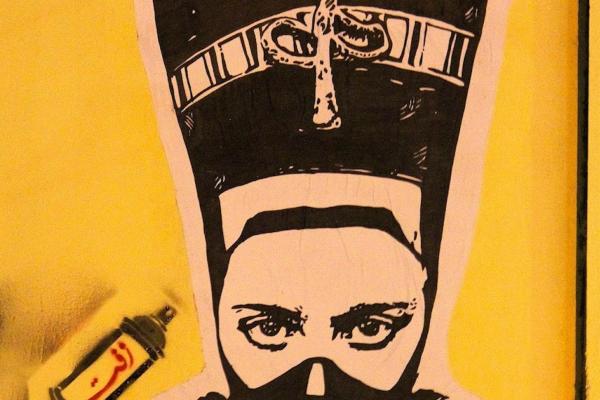
This event is co-hosted by the Middle East Studies Center and OSU Libraries, co-sponsored by the Near Eastern Languages and Cultures Department, the Department of Women's, Gender and Sexuality Studies, the Mershon Center, the Women's Place, and the Multicultural Center, at the Ohio State University.
Parking available at the Tuttle Garage and the Ohio Union. Disability spaces are available in those parking garages and behind Campbell Hall for visitors with valid disability permits. Payment for parking can be made by meters or through the campus parc smartphone app (note that any visitor spot can be made into a disability spot if paid for through the app). Further parking accessibility information is located here.
A story of women, art and revolution, this vibrant film documents the critical role that revolutionary street art played—and is continuing to play—in the political uprising of Egypt. Introducing a cadre of courageous and gifted female artists who are deeply involved in the struggle for social and political justice, NEFERTITI'S DAUGHTERS illustrates the surprising ways that artwork, instead of being relegated to dusty museums and academia, can instead become a powerful tool in the ongoing fight for civil and human rights.
Conversations with prominent Egyptian artists Bahia Shehab, Mira Shihadeh and Salma Samy—each from a different generation—weave throughout the film's narrative. As the women discuss their work and the ways that it is inspired by and responds to a violent and complicated political environment, viewers are offered a rare window into the struggles of living and creating in Egypt today.
For Shebab, Shihadeh and Samy, art can serve many functions: memorializing acts of government brutality; calling potential comrades into the struggle; turning the tables on male predators and sexism; and imagining a world where a woman would be permitted to sing the sacred Adhan, the Muslim call for prayer.
Acclaimed journalist Shahira Amin and art historian Christiane Gruber, author of Creative Dissent: The Arts of the Arab World are among those who add valuable context. As they illustrate, street art has long been a key means of communication and dissent during times of political transformation and social instability in Egypt. Techniques, styles and symbols from Egyptian history are re-appropriated and adapted to become relevant today—including the image of the legendary Queen Nefertiti, a powerful symbol in an ongoing fight for justice.
"Three stories intersect in this compelling short film from director Mark Nickolas: the emergence of Egyptian street art, the oppression of women in the country, and the revolution that toppled President Hosni Mubarak but didn't stop government brutality against Egyptians." —Aspen Times
- First Prize, Athens Film Festival
- Gold Medal, WorldFest Houston
- Stony Brook Film Festival
- San Joaquin International Film Festival
- Rhode Island Film Festival
- On Location: Memphis Film Festival
- DocUtah Film Festival
- Hamptons Take 2 Doc Fest
- Aspen Shortsfest
- Raindance Film Festival
- Napa Valley Film Festival
- Tallgrass Film Festival
- Heartland Film Festival
- St. Louis International Film Festival
Watch this video of an interview with one of the artists, and see http://icarusfilms.com/new2015/nef.html for information from the distributor.
